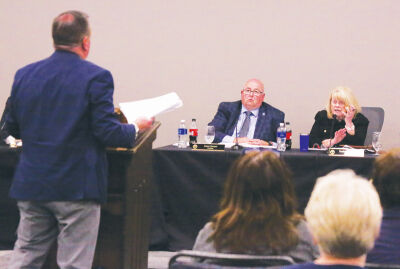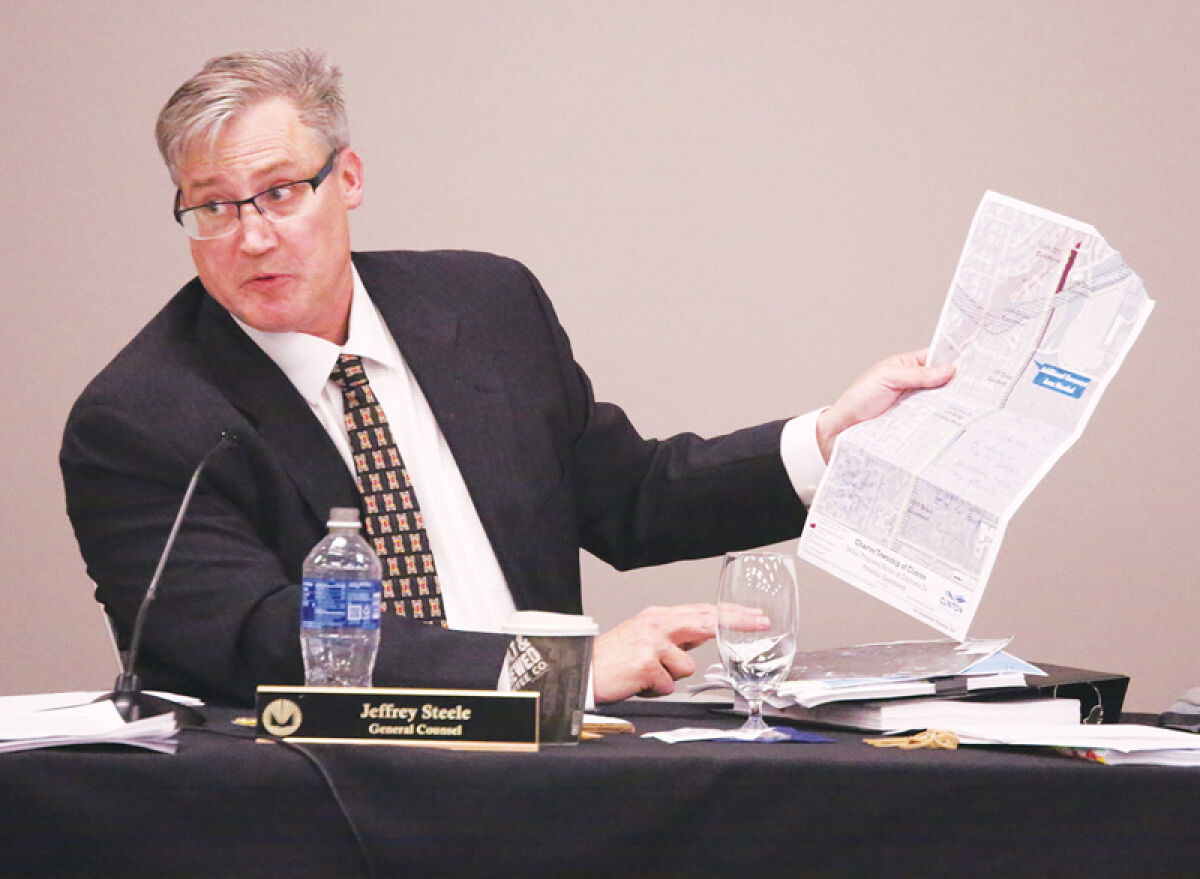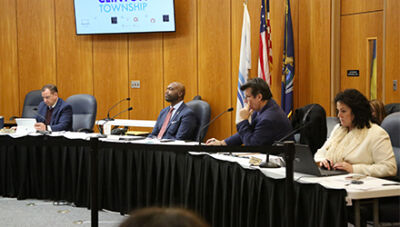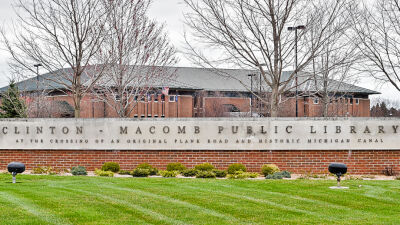
Clinton Township Supervisor Paul Gieleghem, left, argues with Macomb Community College President James Sawyer and Board of Trustees Chairperson Katherine Lorenzo at the May 21 MCC Board of Trustees meeting.
Photo by Dean Vaglia
WARREN — The hopes of Clinton Township officials and residents were dashed May 21 after Macomb County College trustees unanimously rejected a request to support an alternate route for a power line project.
Taking place at a meeting of the MCC Board of Trustees, the township’s request for the college to approve using its land at its Central Campus along Dalcoma Drive for power lines serving the expansion of Henry Ford Macomb Hospital was heard. Electricity transmission company ITC is currently requesting the township approve a power line route that follows 19 Mile Road, which has come under fire from residents of the Westchester Village Condominiums, where the lines would reportedly hang around 50 feet from residences.
After initial remarks from township representatives — Clinton Township Supervisor Paul Gieleghem, attorney Jack Dolan and Trustees Julie Matuzak and Shannon King — and residents pleading their case and asking for the college’s cooperation as an act of friendship between the public bodies, MCC attorney Jeffrey Steele and the board spent roughly the next hour dismissing and dismantling the township’s request.
“Clinton Township came to us with a two-and-a-half-page letter,” Steele said. “The letter, when it was presented, had no attachments, no blueprints, no proposed routes, no approval from regulatory agencies, no nothing … What does the letter contain? It contains some, shall we say, problematic statements which we believe misrepresent some facts and use clever phrasing to create a false impression that the college is the only thing that stands in the way of the lines running down Dalcoma. And that would be a false impression indeed; the Dalcoma route is not all set to go if the board votes ‘yes’ tonight — far, far from it.”
Among the points brought forth by the attorney: the township’s non-expertise in power line construction, that extensive work had been done to secure the rights to build the power lines and that changing direction now would lead to years of re-acquiring regulatory approvals.
Several of the college’s points stood out as particularly damning to the township’s case.
A map of what appears to be a Dalcoma Drive route from 2021, discovered in an email by a Freedom of Information Act request of MCC information, has been touted by township officials as key evidence of the viability of running power lines along Dalcoma Drive. Steele, however, found the township’s characterization of the map to be inaccurate.
“This is an interesting email,” Steele said. “This wasn’t drafted by ITC … This email was sent by an employee of Henry Ford Hospital. This wasn’t sent to the president of the college, this wasn’t sent to the business office. … There’s no formal offer to buy college property. It didn’t contain any formal blueprints. It didn’t come from ITC. What it did have was two photographs. It had one photograph of a tall monopole … It also had this document, which appears to be a screenshot from Google Earth. It shows part of Center Campus, it shows the hospital and shows some residential property to the west. And it has a red line just drawn down the side by Dalcoma (Drive.) There’s no specs. There’s no clear indication of how deep these lines would have to go into the property, no dimensions. No statement about the type of easement that would be necessary. No statement about the setbacks or clearances that would be required. And in fact … it says ‘preliminary’ on it three times, including once in big red letters.”
Given the details of the map, Steele believed it was “early brainstorming from a Henry Ford employee” rather than a serious proposal pursued by ITC.
Steele also found the township’s argument that a Dalcoma Drive route would have less impact on residents to be faulty as well, even stating Dalcoma Drive power lines would affect more township residents.
“Parenthetically, the routes that Clinton Township asked ITC to consider seem to belie the township’s current claim that they’re concerned with residential impact,” Steele said. “One route proposed by Clinton Township cuts dead-center through Westchester Village condos; so instead of having one side affected by the power lines, their route has two sides, and this route also goes by the Carlyle Place Apartments. Another route proposed by Clinton Township goes all along the entire south side of the (Lakeside) Village Apartments and the north side of the Carlyle apartments. Another route proposed by Clinton Township goes all along the north side of the Lakeside Village Apartments and the south side of the Colony condominiums. And the Dalcoma route that we’re talking about tonight goes down Dalcoma and there’s numerous condos along (the west side of) Dalcoma.”
In its documents and Gieleghem’s initial statement to the MCC board, township officials dismissed many arguments against running power lines along Dalcoma Drive — including arguments on the grounds of aesthetics and that the power lines would impact growth of the college’s campus — as “red herrings.” MCC President James Sawyer took issue with the idea that ceding Dalcoma Drive-adjacent land for power lines would not impact growth.
“At the hospital’s request, the college donated 6.5 acres of land to extend Dalcoma Drive to Hall Road to increase community access to Henry Ford Hospital,” Sawyer said. “When the hospital needed additional land for parking adjacent to their facilities, we conducted a land swap to accommodate their needs. When the hospital and Macomb Intermediate School District needed a parcel of the college’s land to accommodate infrastructure support for their expansion plans, we sold them the parcel. And we continue to allow the hospital free use of the college’s land on Hall Road, University Drive and Dalcoma Drive for hospital signage. At this point, Macomb’s land adjacent to Dalcoma represents the only area on Center Campus suitable for development to support future educational needs. It is the college’s responsibility to preserve and protect the assets that the community has invested in the college for educational purposes and use them exactly for the purposes intended.”
Throughout Steele’s remarks, township officials and Westchester Village residents alike interrupted proceedings, causing Board Chair Katherine Lorenzo to bang her gavel for order several times and threaten them with removal from the meeting. They were there to protest the board’s approach to the matter and attempt to sway a unanimous no vote that was nigh inevitable.
“What was done here tonight was an obfuscation and a travesty,” Gieleghem said after the meeting adjourned. “The attorney (being) granted 40 minutes to impugn the township but speak glowingly about ITC really reveals the position that they’re taking.”
In April, Gieleghem declared the Clinton Township Board of Trustees’ June 2 meeting would be the day a decision gets made regarding ITC’s request for a 19 Mile route. The meeting will take place one day after residents of the Westchester Village Condominiums finish voting on whether to support abandonments for the ITC project, though Gieleghem would not say if or how the condominium residents’ decision would impact the board’s decision on the matter.
“The township board makes their decisions based on what is in the best interest of the community as a whole, not just what is best for the particular institution or a particular group,” Gieleghem said. “I’m not going to say which way the township board is going to vote.”
Several members of the township board have advocated voting against the ITC 19 Mile route. If the township rejects the route, ITC is expected to seek approval through the Michigan Public Service Commission.
 Publication select ▼
Publication select ▼



























